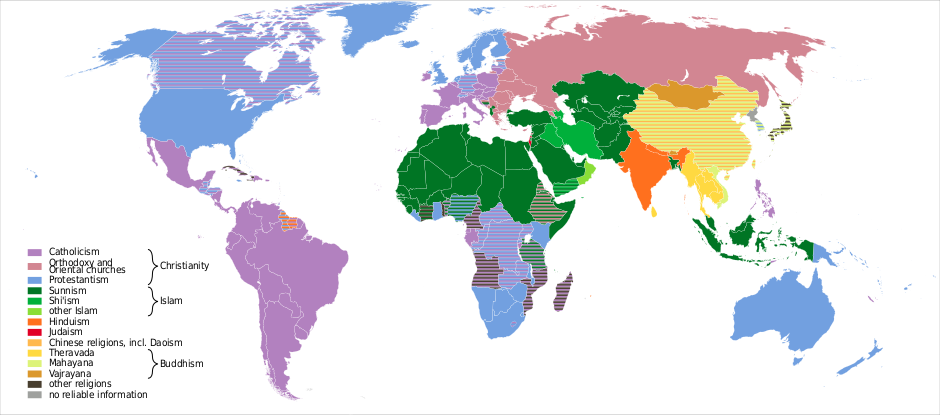Converting Statists to Voluntaryists: The Path of Least Resistance (science and morality)

Philosophers love ideas, and we have a tendency to dig rabbit holes the size of the known universe. When trying to negotiate a truce with a force that outnumbers you 20 to 1, it might be easier to address the minimum set of philosophical concepts that are necessary to mutually pursue both truth and peace. It can also help if you first form a genuine connection with the other person. The same principle holds if you are trying to negotiate peace one-on-one with a friend, spouse, neighbor, or anyone else. I like to generalize my approach like this: It is not necessary to convert all Jews to Catholicism for the two to live in peace.
The main theme of my blog will be to help people develop the communication skills so that voluntaryists (or peace-seekers in general) can approach people in a nonthreatening, cooperative manner that sets the stage for productive conversation. Many of these initial posts will be about topics that will help participants in this path get an idea of the direction of this blog. These posts are for people who willingly want to purse peace in this way, not something that you forward to a person you have been fighting with the expectation that they will convert.

Connect Through Feelings, not Philosophical Concepts
I have mentioned the strategy of connecting with people by understanding how they feel. This technique has been used by psychologists to connect with patients in clinical interviews, and it has been used in other venues for negotiating for nonviolent solutions to even the most extreme conflict (as in the wake of tribal massacres in Africa). I will cover this in detail in subsequent posts.
In one-on-one cases, two people understanding how their actions hurt the other person is often enough to help both people find a solution without three PhDs in philosophy or theology. It is a lot easier for a Catholic to let a Jew know that his car tire is currently is currently on her foot, and that it hurts really bad than it is to first convert a person to a new religion before finding a way to stop the pain. I will discuss many details on this topic in future posts.

Discuss the FEELING of Liberty vs Oppression in Simple Terms
Progressives in the USA often rely on the assertion that they can accurately identify the common good (or utility) of social welfare policies. Empirically, there are a bunch of instruments that measure various things, like economic development, self-reported happiness (Cuba previously ranked exceedingly high on that scale), infant mortality, and even liberty (ha! notice how liberty is not mentioned on the page of progressive measures of quality of life!). There is no objective basis for measuring any of these against an unlike thing, such as the cost of liberty or the logical inconsistency of punishing people for stealing and building a system built on forcibly taking money from people... BUT, we do not have to get full endorsement on the philosophical antecedents of voluntaryism to work toward peace.
I see a potential path to peace by keeping it simple and introducing reasonable doubt in the statist's mind, combined with some kind of genuine connection with liberty-minded people. I recommend that you try the following after you have made a strong connection with your partner.
- Tell your partner how you would feel (not think) when somebody takes your possessions against your will (use phrases like "take your possessions against your will" rather than "steal" because they don't see taxes as theft and you can have one less philosophical argument that you could win by talking about how you feel),
- See if your partner is willing to define harm according to the victim's point of view, not the perpetrator's point of view,
- See if your partner is willing to listen to the victim's claim of harm and then negotiate in good spirit to avoid that harm (this is difficult in cases of shared resources, like water or generational war, as in Israel and Pallestine),
- Discuss with your partner the lack of agreement on what "common good" is,
- Discuss the lack of an objective way to measure the "common good" on the same scale as unlike things, such as the liberty lost by taking tax money from people against their will.
- Ask your partner to consider the value of everyone observing self-constraint in forcing others to do things against their will--in other words, consider the potential reduction in conflict if each person used his or her own moral beliefs to guide his or her own behavior and offered broad latitude to others before acting against them. Maybe discuss Deuteronomy 22 as examples of things that might or might not be forced on others (that is a discussion that could go in many directions, and that is the point).

pixabay
Help Statist See That You are a Real Person, Then Keep it Real
Statists will have to see you as a real person to overcome the cartoon caricatures of anarchists or voluntaryists (or whatever label they apply to you). Without knowing you, they might expect that you are lying to achieve a desired end or that you are just regurgitating the party line. I will be posting a guideline for how to connect with people one-on-one to do that. In the mean time, here is a brief speech that you might give after you have made a connection with a statist and listened to how they feel about some policy (in this case, social welfare).
We can easily agree to not take things from each other against the other person's will and not attack the other person against that person's will. When people act against the will of another, the consequences are in the real world. I would feel a sense of loss if somebody takes something from me against me will. There might be other consequences.
Poor people would financially benefit from forcibly taking money directly from me, but we already know that we oppose that. Maybe the poor person creates a story that such theft is justified because of some story about marginal utility. That story is in storyland. I lack any objective basis for determining where the story in that person's head connects to reality to justify the exception to the rule.
We can agree that we prefer all people to refrain from attacking us or taking things from us, that is not in dispute. You suggest that there is an exception that allows the state to do things to us against our will. I have heard the stories about something magical happening when 51% of people vote on something, but I can't see any objective evidence to believe that the story real.
Perhaps you don't feel bad when the government regulates marriage or takes money from other people to spend on social programs, but I do. I also see it as a logical contradiction of the principles that we already observe in respect for our neighbors. I'm asking you to avoid supporting people or policies that cause the government to take things from me or restrict my peaceful actions because those acts against me happen in the real world, they have real, negative consequences for me, and I have no evidence to believe that the story justifying these acts is real.
I haven't heard of a way to measure my sense of loss accurately to bring it into storyland. I honestly see no connection between the real world and the story that justifies an exception to the rule that we agree on (about not taking things from each other).
I won't take things from you against your will, and you agree to not take things from me against my will. I wont impose my story on you, you won't impose your story on me. You can donate everything you have to the poor without taking things from me against my will--I'm OK with that. You can ask me for help or to volunteer, I might help.

Wikipedia
Question the Certainty of Moral Beliefs
Many people hold firm beliefs related to religion, politics, and society, but when those beliefs are interpreted as facts, as opposed to subjective preferences.
I have frequently presented people with (printed or verbally described) pie charts that show the lack of agreement on various issues. The intended observation is that if you ask everybody 10 contentious religious or political ideas, the overwhelming majority of people on the planet will disagree with you. The intended conclusion is that humans, as a species, are not naturally endowed with an accurate and reliable mechanism for identifying the truth of certain kinds of complex moral or social questions. Instead, what I find is an abundance of people pointing to all the "other" people and insisting that they are stupid or otherwise suffering from delusion or manipulation by stupid forces. Everyone can see the errors in others but few can admit that some of their most cherished beliefs might be inaccurate. Maybe with more people talking about disagreement among humans and the inference that we are prone to error, people will start to see that humans are not naturally endowed with an accurate and reliable mechanism for identifying the truth of certain kinds of complex moral or social questions.
Here is one way to help people appreciate the difficulty of moral perception. I live in the USA where many people are, or claim to be, Christians. Those who claim to take moral guidance from the Bible (as opposed to relying mostly on prayer, meditation, or modern day prophets), I ask them to tell me the correct moral interpretation of the Sermon on the Mount. When they start to see the diversity of interpretation, they might appreciate the tendency of people to reach different conclusions when given the exact same text as a source. All I want them to see is that humans are not naturally endowed with an accurate and reliable mechanism for identifying the truth of certain kinds of complex moral or social questions.
In other places, I might use the phrase intellectual humility to refer to the tendency to hold conclusions tentatively rather than hastily declaring that a conclusion (or moral belief) is 100% correct with no chance for error. A person with intellectual humility will admit the possibility that the conclusion that they drew from evidence could be imprecise or inaccurate.

santa template from pixabay
Say "There Is a Lack of Evidence to Support the Claim..."
Lay people have a strong tendency to believe stories when they like the conclusion. Kids in the USA believe that Santa Claus flies around the globe on Christmas eve, comes down the chimney, and gives presents to all the good little boys and girls. Adults believe stories about politics and religion when they like something in the story. These are examples of cognitive bias.
The temptation is to say "Santa Claus doesn't exist," but that is an exceedingly difficult claim to defend. A more scientific and defendable claim would be "There is a lack of evidence to support the claim that Santa Claus exists." There is a big difference between the two statements. You could defend the first statement if you were an omniscient being who surveyed all things and all phenomena in the universe and by process of complete enumeration determined that there is no Santa Claus in the universe. The easier claim is to start with the scientific view of "no conclusion" and say that you remain in that default position because you have no objective basis to believe that Santa Claus exists.
Invariably, people who believe without evidence will say that things exist in the universe for which we currently have no evidence. You can quickly agree, and add that you have no basis for distinguishing which story, among the infinite fictitious stories, will later be supported. To condone the practice of accepting unwarranted stories without evidence is to condone a process by which people move away from reality and into their own storyland. When people live in storyland with respect to moral beliefs, we know from history that there is a great risk of deadly conflict. Let's stay grounded with reality and not start forcing people to do things against their will because an unwarranted story says to do so.

pixabay
Stay Grounded in Evidence and Reality
People don't fight over the color of an orange or the weight of a rock. We can observe and measure such things. In the world of politics, people fight over things that can not be observed or measured objectively. First, some example claims that people fight over:
- We need to ensure that every single mother has a home.
- We need to give children free lunch at school to ensure that every child has an equal chance to learn (and not be distracted by hunger).
- Society will benefit by each person pursuing his or her own needs in an open market.
- We need a government agency to carefully control each business decision to prevent business owners from exploiting workers.
- We can not let people who sell private Medicare Advantage plans to inform the client that the plan has a zero premium until 48 hours after the client has signed paper indicating that he or she is willing to hear details of the plan (CMS regulation).
You might have made moral claims like the ones above and consider them to be the principles that make you human. In every instance when somebody starts a sentence with one of these phrases, they are talking about something that has never been objectively measured by anyone:
- We need to (as a society) ...
- I have a moral right to ... (I am not referring to legal rights)
- You don't have a moral right to... (I am not referring to legal rights)
- People have a moral obligation to...
- We can increase the common good by...
- We will all benefit if we...
- Everybody should...
- X is better/worse than Y.
- That tree has intrinsic value that would be destroyed if you cut it down.
- God said...
This is a difficult concept to accept for most of us because we have been socially conditioned to talk and think this way, but in later posts I will go into more detail about what happens when people confuse their personal preferences for facts about the universe. The short version is this. If somebody claims that they have a right to do something, there is no place on the planet where I can look to see where the universe defines this as a fact. Can I look under a rock and see objective evidence that somebody has a right or an obligation to something? I can tell when a given group of people like one thing more than another, but that does not prove that country music is objectively better than rock and roll. Stick to what a person can feel or measure and describe it as such.
When another person says one of the things above, you can reflect back to them the corresponding item from this list to refer to something that the person can assess in the real world (it is best to do this only after you have made a strong connection with the other person and have listened to them and reflected back the words that they used) something like this;
- You would LIKE everyone to...
- You would LIKE the freedom to...
- You don't LIKE it when somebody does...
- You would LIKE everyone to...
- You would LIKE for everyone to do...
- You LIKE the idea of everyone doing...
- You would LIKE everyone to...
- You LIKE/DISLIKE X more than Y.
- You LIKE that tree and would not be happy if somebody cut it down.
- You LIKE the idea that...
It took me 6 months of struggling to really apply this basic concept of science to one of my moral beliefs. I can not measure a moral right, moral obligation, or intrinsic value, so if I start with the rational default position that something does not exist until I measure it objectively, and I have no way to objectively measure a moral right that I can force onto another person, then I don't conclude that the right or obligation exists in a way that allows me to force that person to do something against his or her will.

pixabay
Dont' Ask for Proof of Their Story
Don't ask a statist or person of another religion to prove his or her story. Simply state that you lack any evidence to believe it. If they want to undergo the effort of converting you, note that the statements are either entirely in storyland or one part in the real world and then an unconnected claim in story land.
Here are some examples were a person starts with an observation in the real world and then leaps into storyland:
[statist] There are 2,000 kids who went to school hungry last year, so we need to implement a free breakfast program in school.
[voluntaryist] It sounds like you LIKE the idea of using what you call public money for this breakfast program because the kids will feel better and maybe have a better chance to perform well in school. Is that right?
[statists] Yes. Now you are getting it.
[voluntaryist] (use an excerpt from "Help Statist See That You are a Real Person, Then Keep it Real" above )

Don't Bother Re-Educating a Hostile Opponent
You do not have the burden of educating people in storyland how to think scientifically. It might help to give them an opportunity to understand that theor moral or political beliefs might be imperfect. Perhaps show the degree to which people around the globe disagree on important social, religions, and political matters. If the person says that the differences are not actually important, then that is just another example of where people disagree--some think the legitimacy of the pope is an important question and some do not.
You don't have to convince a person that their story is wrong, just help them to see that when they use the story to do things against your will, they are part of a bigger problem of people from around the world imposing their stories on others:
- stories of how a wife should have dinner ready at 6:00 p.m. and not leave the house without the husband
- stories of how a given person gets direct revelation from God that nobody else gets
- stories about the right of one person to take things from another person against that person's will
- stories about which measurement tool should be used to justify taking things from others (e.g., we should use a measure of high school graduation rates to justify more taxes to pay for school)
After a person believes one of these stories and develops an emotional attachment to it, it is difficult for the person to apply rational criticism to the belief. The hardest challenge is getting a person to understand their own potential for error when the topic being discussed is a belief that the person holds strongly. You might have a chance to help that person by trying to understand how they feel about those beliefs, and how they feel about surrounding beliefs (e.g., if they reject a religious or political belief, it might affect their relationship with friends or family). Pursue the path of least resistance that might lead to increased peace.
About This Blog and This Post
Please resteem! There is more content coming, so follow me! I drew the stick figures, you are encouraged to repost, or better yet, create a new version that looks prettier and post those somewhere. You can repost the full text on another web site if you put a link at the top to the original on my Steemit account https://steemit.com/@cnacws.
thx
I am literally standing in line at Disney waiting for my daughter to meet The Little Mermaid.
I skimmed this article and this post is a placeholder to remind me to come back and reread it later.
Having argued voluntarilyism with a few friends I’ll be the first to admit I’m not the most articulate in my presentation.
Good job. I look forward to deep diving this later.
harley... Life is way too short to argue. Simply pass this on to your friends. If they care enough about the issues you plan to discuss with them, they will invest the time to listen to Adam Kokesh's "Freedom!" book. ...and of course, one doesn't have to digest the whole thing at once.
Have you read or listened to it? It leaves very little room to argue with. ...especially the concept at its core: I OWN MYSELF. If your friends are going to argue with that, FIND NEW FRIENDS!
Bud. This post has to be the absolute ultimate in irony. Talk about running around Mt. Fuji. When all one has to do when getting someone to understand the "morality" centered around libertarianism/voluntaryism is attack the problem at its root:
DO YOU OWN YOUR OWN LIFE?
and "feelings" have absolutely nothing to do with this. I don't give a crap whether some thug, parasite, whore, controlFreak or other unsavory, uncivilized brute 'FEEEEEELS' like allowing me my sovereignty. It's irrelevant.
Now, we either get that person to agree, or we simply fortress off, assuming that person who ran over your toes with his car, DID IT ON PURPOSE, and be on guard for the next time you encounter him, whereas he will assuredly mow you over in an act of murder.
Do you think Adam Kokesh will be dealing with that damned sheriff in TX by appealing to his phuquin' feelings? Seriously?
Hi fundposhprincess, I'm not sure what you mean by "fortress off." Does that mean that you will not interact with that person or prepare defenses against an attack, or start a war? Maybe give me an idea of how you can use the "fortress off" approach in your neighborhood to work toward voluntaryism.
a mild combination of the first 2. No point in starting a "war" with one person. Social and economic ostracizing is usually sufficient, along with firm standing NO TRESPASSING signs. Any interaction would be at "arms length".
Disneyland "fortresses off" those who don't follow the rules. Yes? A church, synagogue or mosque does the same. This pact amongst (or against) people can be obtained on any private property in a voluntaryist "neighborhood", town, village, community, city, county, nation, state, province.
Why? Because each of us owns our own lives. I can't be FORCED to associate with those I disdain or don't trust. Yes?
I see your approach as reasonable in situations in which the threat is directly from that person or, maybe, if there is a pathway to use those methods to achieve a larger scale victory at some point.
Your mention of what churches do (and any group of like-minded people could do) is what I would usually call shunning, but I think they are about the same thing as what you said.
Each person has a different sense of what is a threat. Putting aside my unusual example of somebody running over your foot with a car, I might have more tolerance (or stubbornness) of talking with people to reach an understanding. If a person does not have the time, or patience, or skills to do that, then other options look better.
Given my background and what I know/believe about the psychological barriers to attitude change, I'll continue to try the talking approach... as long as I have the time and patience.
thx
This libertarian, having been at it since 1976, is about as "talked to death" as one can imagine. So when I come in contact with someone I perceive to show some hope (not locked into his "9 dots"), I simply work the "Do you own your own life?" angle first. If I get a resounding yes, or even "I think so...", I drive him over to "Adam Kokesh Avenue" and show him the "Freedom!" book. I tell him to finish it (or the audio file) and we'll discuss it further afterwards. Straightest path between the two points; stay away from Mt. Fuji and lots of mulberry bushes.
Couldn’t agree more . Good point .
Great post, lot's of good tips, thank you, I will be following you for more.
Everybody should brush their teeth.